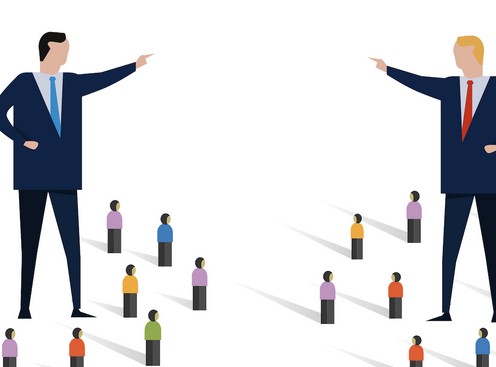In an era marked by rapid communication and widespread information access, political discourse has taken center stage. While healthy debate is a cornerstone of democracy, the growing political divide has escalated tensions and strained relationships across the globe. In this comprehensive exploration, we delve into the intricacies of political polarization, dissecting the factors that fuel division and examining the consequences of escalating tensions.

The Rise of Political Polarization: A Global Phenomenon
Political polarization, characterized by the widening gap between opposing political beliefs, has become a prevalent global phenomenon. Differing ideologies and contrasting worldviews have led to the formation of distinct echo chambers, where individuals are exposed only to perspectives that reinforce their existing beliefs. This lack of exposure to diverse viewpoints contributes to the amplification of divisions.
The Role of Media and Social Media: Echo Chambers and Confirmation Bias
Media outlets and social media platforms play a significant role in shaping public opinion. Algorithms often prioritize content that aligns with users’ preferences, reinforcing existing biases and fostering echo chambers. Confirmation bias, the tendency to seek out information that confirms preconceived notions, further entrenches individuals in their respective ideological bubbles.
Emotion Over Reason: The Impact of Cognitive Biases
Cognitive biases, such as the affect heuristic and the backfire effect, play a pivotal role in intensifying political tensions. The affect heuristic leads individuals to form judgments based on emotions rather than rational analysis, while the backfire effect causes individuals to double down on their beliefs when confronted with contradictory evidence.
Polarization and Identity Politics: The Us vs. Them Mentality
Identity politics, where political alignment becomes intertwined with social identity, exacerbates divisions. This “us vs. them” mentality reinforces a sense of belonging among like-minded individuals while stigmatizing those with differing opinions. This phenomenon can lead to intolerance and hostility towards opposing viewpoints.
Social Fragmentation: Implications for Society
As political polarization deepens, social fragmentation ensues. Friendships, families, and communities can fracture along political lines. This fragmentation not only hinders constructive dialogue but also weakens the social fabric that binds communities together.
Escalating Tensions: Consequences of the Political Divide
Escalating political tensions can have far-reaching consequences, affecting governance, social cohesion, and even mental health. Polarization can lead to legislative gridlock, hinder policy-making, and erode public trust in institutions. Moreover, heightened tension can cause stress and anxiety, as individuals feel pressure to conform to their group’s ideologies.
The Way Forward: Navigating Political Divide with Empathy and Dialogue
Overcoming political polarization requires a commitment to empathy and open dialogue. Fostering genuine conversations that transcend echo chambers allows individuals to understand the perspectives of others, even if they disagree. Promoting media literacy, critical thinking, and respectful discourse can help bridge the gap and promote a more inclusive political environment.
Conclusion: Nurturing Unity in a Divided World
While political differences are an inherent part of society, the escalation of tensions and the erosion of empathy pose significant challenges. Recognizing the factors that contribute to political polarization is the first step toward fostering productive conversations and rebuilding social connections. By nurturing a culture of respectful dialogue and seeking common ground, we can work towards unity and cooperation in a world that is increasingly divided by political ideologies.
